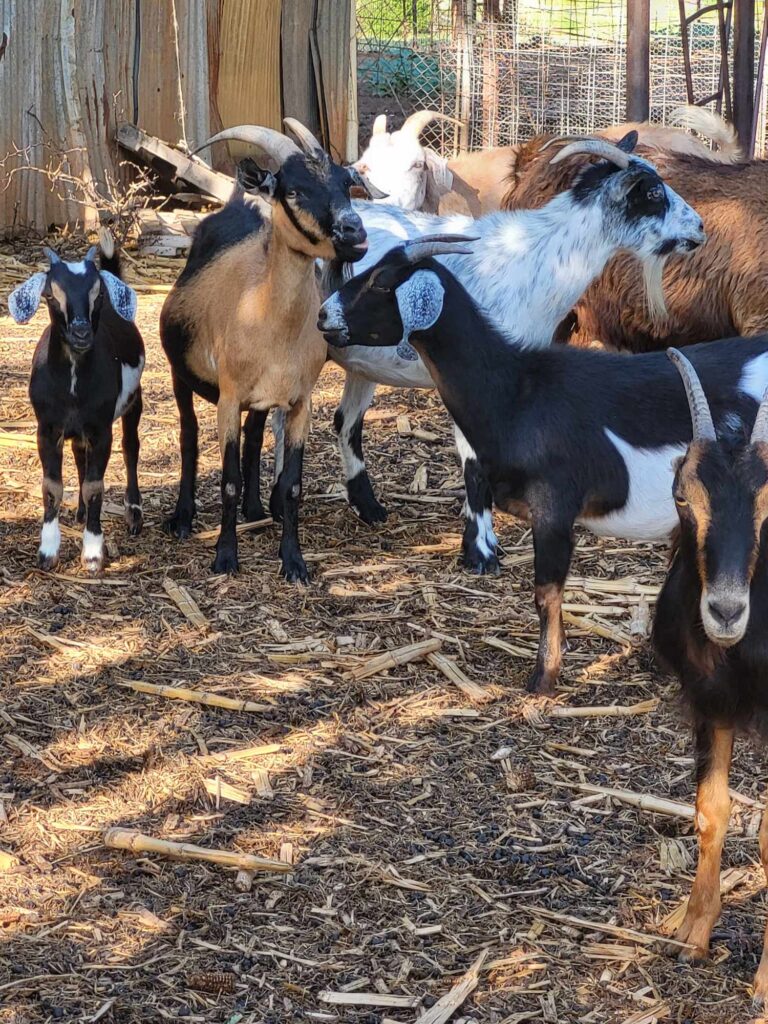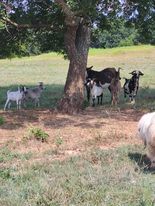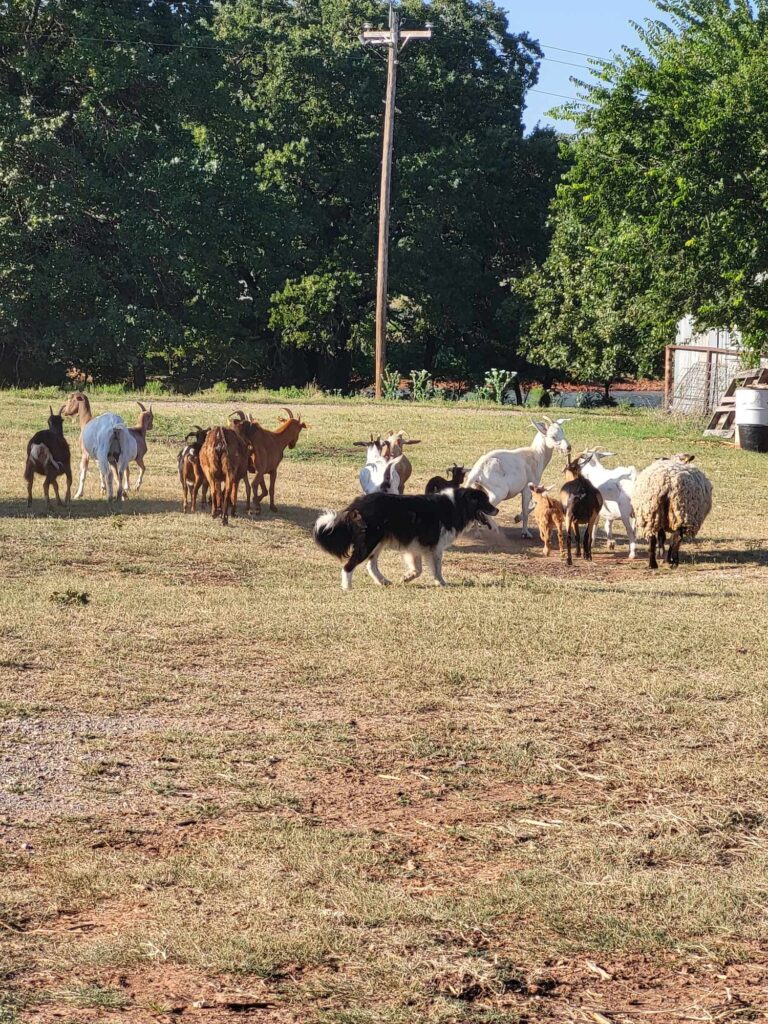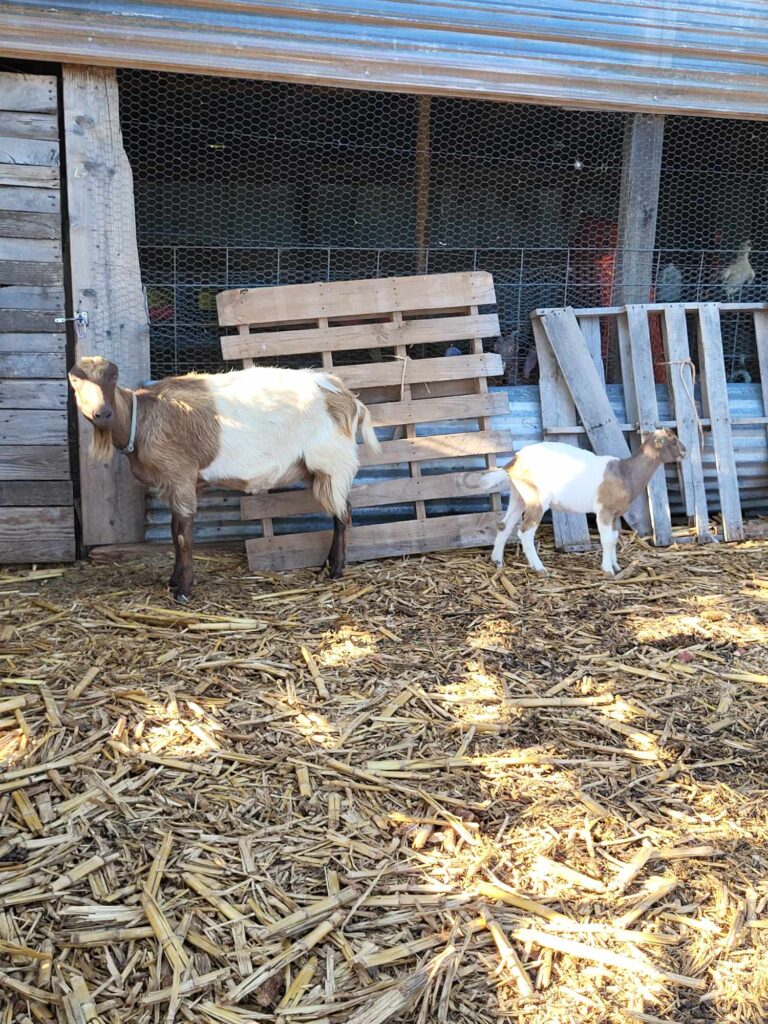Goats are easy and hard to raise. If you have them, you can identify with this statement. This guide to a happy herd will address some key points for raising goats and there will be several more posts on this topic to follow.
A happy goat herd is key to a thriving homestead. Goats provide milk, meat, fiber, and even companionship, making them valuable members of any homestead. However, ensuring they stay healthy and content requires careful planning and consistent care. Here are 14 essential points for keeping your goats happy and your homestead thriving:
- Choose the Right Breed for Your Needs: Different goat breeds have distinct traits suited to various purposes—dairy, fiber, meat, or pets. For example, Nubian goats are known for their high milk production, while Boer goats are ideal for meat. Researching breeds beforehand ensures you choose goats that meet your homesteading goals, making them easier to manage in the long run. Selecting the right breed also ensures their needs align with the climate and space available on your homestead, contributing to their long-term happiness.
- Require Secure Fencing: Goats are notorious escape artists, so sturdy, well-maintained fencing is essential to keep them contained. This is a MUST with goats – they will look for anyway to get out, the problem is they have a lot of predators. Choose sturdy fencing materials like woven wire or electric fencing, ensuring it’s at least 4 to 5 feet tall. Regularly check for weak spots or openings, as goats will test any vulnerabilities. Secure fencing not only prevents escapes but also keeps predators like coyotes and dogs at bay. A well-fenced pasture keeps your herd safe and happy, giving you peace of mind.

- Socialization and Companionship: Goats are social animals and thrive in herds. Isolating a goat can lead to depression and stress, which negatively impacts their health and productivity. Always keep at least two goats together to provide companionship. Additionally, interacting with them regularly helps build trust and reduces fear. A well-socialized goat is easier to handle, happier, and less prone to stress-related health issues. If you have time, train them to come when called or follow simple commands, which can enhance their bond with you.

- Feed a Balanced Diet: Goats require a balanced diet to stay healthy and productive. While they thrive on pasture, supplementing with hay and a little grain is necessary, especially during winter or when pasture is limited. Minerals, especially salt and calcium, are vital for their bone health and milk production. They need copper bolus yearly, offer baking soda, and free-choice access to mineral blocks or loose minerals designed specifically for goats. Fresh, clean water is also a non-negotiable daily necessity, as dehydration can lead to health issues. While goats are known for eating almost anything, they need a balanced diet with specific nutritional requirements to stay healthy. Their feed doesn’t not need to be high quality hay but they need a variety of hay and shrubs available to munch on.

- Are Great for Land Management: They are excellent at clearing brush and weeds, making them useful for managing overgrown areas. They will eat what cows and horses won’t. I use ours all over the pastures to get under the oak and pecan trees to clean up the briar and other weeds the cows won’t eat.
- Offer Sufficient Space for Grazing and Browsing: Goats are natural browsers and love to forage for food. They need ample outdoor space to roam and graze on shrubs, grasses, and leaves. A fenced-in pasture provides room for them to move freely, explore, and stay mentally stimulated. Allowing goats to graze also helps meet their dietary needs and reduces feed costs. Rotational grazing systems can prevent overgrazing, ensure a steady supply of fresh forage, and contribute to soil health on your homestead.
- Regular Health Checkups and Vaccinations A healthy goat is a happy goat, and preventive care plays a big role in maintaining your herd’s wellbeing. Regular health checkups, including hoof trimming, deworming, and vaccinations, are necessary to avoid common issues like parasites, foot rot, and respiratory diseases. Establish a relationship with a veterinarian who specializes in livestock or goats. Being proactive with health care ensures your goats are not only happy but also more productive, whether for milk, meat, or fiber. Goats’ hooves grow quickly and need regular trimming to prevent issues like hoof rot and lameness. There are several you-tube videos available to show you what to do. Also be sure the goats are not in a wet pen and are able to stand or lay in a dry spot.
- Provide Mental Stimulation: Goats are intelligent and curious creatures, and boredom can lead to behavioral issues such as fence-breaking or destructive habits. Providing them with mental stimulation helps keep them content and engaged. Simple activities like allowing them to climb on rocks or providing toys, such as logs and spools, can help them stay entertained. Mental stimulation isn’t just about avoiding boredom—it contributes to their overall happiness and emotional well-being, especially in confined spaces.
- Breed Responsibly: If you’re planning to breed your goats, responsible breeding practices are essential to maintaining a healthy and happy herd. Ensure that both the doe (female) and buck (male) are in good health and free from genetic defects before breeding, and are NOT related. Plan ahead when breeding since gestation time is 5 months and baby goats are very susceptible to cold. There either needs to be a good structure for winter kidding or keep the bucks separated until weather in your area the weather stays above freezing. Monitor the pregnancy and birth process closely, and be prepared to assist if necessary. Proper care during breeding seasons helps ensure a smooth process and the birth of healthy kids, contributing to the overall happiness and health of the herd.
- Can Be Affectionate: Many goats enjoy human interaction and can form strong bonds with their caregivers, often seeking attention and affection. Once you start feeding your goats they learn you will bring food and they will follow you anywhere.

- Are Susceptible to Parasites: Regular deworming and monitoring for parasites are crucial for maintaining their health. Check the color of their gums, called Famacha, pink is good, white means anemic and needs help right away. It is best to cull goats that tend to have a heavy parasite problem and breed for strong offspring. You can use paste, drench or injectable wormers and rotate kinds of wormers to keep the parasites from getting resistant to the wormer.
- Stay Attuned to Your Goats’ Behavior: Knowing your goats individually is key to maintaining a happy herd. Pay attention to their behaviors, eating habits, and energy levels. Goats are good at masking illness, so subtle changes in their demeanor, such as a loss of appetite, isolation from the herd, or lethargy, could indicate a problem. Early intervention when issues arise can prevent serious health problems. Building a strong connection with your goats will help you spot these changes and address them quickly, keeping your herd in peak condition.

- Require Shelter: Goats need a dry, draft-free shelter to protect them from extreme weather conditions and predators. Goats are resilient but need protection from extreme weather conditions. A sturdy, well-ventilated barn or shed is essential for keeping them dry during rainy seasons and cool during hot summers. Ensure the shelter is spacious enough for each goat to lie down comfortably and has a dry, clean bedding area. Goats are susceptible to respiratory issues when confined in damp, dirty conditions, so keeping their shelter clean and properly maintained is crucial for their health and happiness.
- Are Intelligent: Goats are smart and can be trained to follow commands and even perform tricks. This intelligence also means they can be quite mischievous. They are very inquisitive, which gets them into all kinds of trouble. They love to climb, jump and explore their surroundings. They can get themselves in a bind easily so need to be watched and checked often.
Conclusion:
A happy goat herd is the cornerstone of a thriving homestead. By providing proper shelter, nutrition, socialization, and care, you ensure your goats remain healthy and productive. Happy goats are not only more enjoyable to be around, but they also yield better results, whether you’re raising them for milk, meat, fiber, or companionship. With thoughtful management, your goats will thrive and contribute to the success of your homestead for years to come. Raising goats is a rewarding experience that comes with its unique set of challenges, but with proper care and attention. They can be a valuable and enjoyable addition to any homestead.
This article just scratches the surface of raising goats. There will be much more information.
Thanks for reading and I’d love to hear from you email me at luron@homesteadingwithgrandma.com
